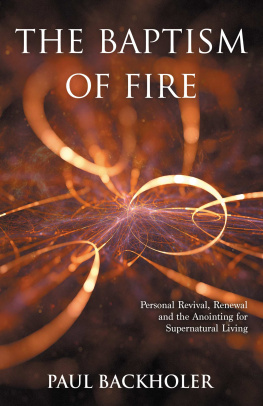Mark Stibbe - Explaining Baptism in the Holy Spirit
Here you can read online Mark Stibbe - Explaining Baptism in the Holy Spirit full text of the book (entire story) in english for free. Download pdf and epub, get meaning, cover and reviews about this ebook. year: 1995, publisher: Sovereign World, genre: Religion. Description of the work, (preface) as well as reviews are available. Best literature library LitArk.com created for fans of good reading and offers a wide selection of genres:
Romance novel
Science fiction
Adventure
Detective
Science
History
Home and family
Prose
Art
Politics
Computer
Non-fiction
Religion
Business
Children
Humor
Choose a favorite category and find really read worthwhile books. Enjoy immersion in the world of imagination, feel the emotions of the characters or learn something new for yourself, make an fascinating discovery.
- Book:Explaining Baptism in the Holy Spirit
- Author:
- Publisher:Sovereign World
- Genre:
- Year:1995
- Rating:5 / 5
- Favourites:Add to favourites
- Your mark:
- 100
- 1
- 2
- 3
- 4
- 5
Explaining Baptism in the Holy Spirit: summary, description and annotation
We offer to read an annotation, description, summary or preface (depends on what the author of the book "Explaining Baptism in the Holy Spirit" wrote himself). If you haven't found the necessary information about the book — write in the comments, we will try to find it.
Mark Stibbe: author's other books
Who wrote Explaining Baptism in the Holy Spirit? Find out the surname, the name of the author of the book and a list of all author's works by series.
Explaining Baptism in the Holy Spirit — read online for free the complete book (whole text) full work
Below is the text of the book, divided by pages. System saving the place of the last page read, allows you to conveniently read the book "Explaining Baptism in the Holy Spirit" online for free, without having to search again every time where you left off. Put a bookmark, and you can go to the page where you finished reading at any time.
Font size:
Interval:
Bookmark:
It is now time to turn our attention to the purpose of baptism in the Spirit. We have seen so far that it is an essential part of our initiation (the normal Christian birth), that it is a profound experience, and that there is always evidence of its reality in a new believers life. Why, then, does God want us to be baptised in the Holy Spirit? What, in brief, is its purpose?
It is at this point that we need to look in some depth at Jesus experience of Spirit baptism at the River Jordan. In many ways Mark, Matthew and Luke present this event as a kind of model for the disciples initial reception of the Spirit. We can therefore learn a great deal from the Masters example. Indeed, we will soon see that the purposes for which the Lord was baptised in the Holy Spirit are similar for us today.
Over the next few pages we will examine Marks account of the Jordan experience. His is the shortest version, and it is the most convenient for our discussion of the purpose of Spirit baptism:
At that time Jesus came from Nazareth in Galilee and was baptised by John in the Jordan. As Jesus was coming up out of the water, he saw heaven being torn open and the Spirit descending on him like a dove. And a voice came from heaven: You are my Son, whom I love; with you I am well pleased. (Mark 1:9-11)
From this brief passage, and also from its context in Marks Gospel, I would like to suggest that the Spirit baptism of Jesus had three specific purposes. These three purposes can be summed up under the headings, sonship, service and sacrifice. We will examine all three of these purposes in relation to Jesus, and then in relation to ourselves.
Let us begin by noticing who is involved in the baptism of Jesus in the River Jordan. At the human level, only two people are mentioned, John the Baptist and of course Jesus of Nazareth. At the divine level, however, there are three persons at work in this event. There is the Son who is baptised. There is the Spirit who descends upon him. There is the Father who declares his pleasure. At the divine level, the baptism of Jesus is an event involving the Father, the Son and the Holy Spirit. It is an action involving all three persons of the Holy Trinity.
The first thing to say about Jesus Spirit baptism is therefore this: that it contained a profound revelation of Jesus sonship and a profound revelation of the Fathers love. When the Spirit baptises Jesus, the heavens are torn open and Jesus hears the Father shouting out in both heaven and on earth, You are my Son, whom I love; with you I am well pleased. Jesus hears the Father saying, I love you, my Son.
It is difficult to know quite how conscious Jesus was of his unique sonship before this event. I suspect that this knowledge grew as he grew. We can be sure of one thing, however. After his baptism, Jesus can have been in no doubt at all about this eternal sonship. He would have known with complete and unshakeable certainty that he was the unique Son of God. He would have known that God is Abba, Dear Father, and that he was destined for a very special task.
If Jesus baptism in the Spirit involved a powerful affirmation of his sonship, it also involved a tremendous experience of power for service and for mission. When the Spirit came down upon Jesus, he was immersed in the supernatural power of God as surely as he had just been immersed in the waters of Jordan. He was anointed for charismatic ministry in a way that he had not been before.
It is extremely important at this point to read the story of Jesus baptism in its immediate context. We will first of all see that just before his baptism, Jesus is referred to by John the Baptist as a More Powerful One. John says, After me will come a More Powerful One than I (Mark 1:7). Immediately after that, Jesus appears and receives power from heaven at his baptism. Immediately after that, Jesus begins a ministry of power and authority. He preaches about the Kingdom of God and wins disciples (Mark 1:14-20). He teaches with an authority that astonishes his listeners (1:21-22). He delivers those who are demonised (1:23-28). He heals many sick people (1:29-34). As Mark puts it,
He travelled throughout Galilee, preaching in the synagogues, and driving out demons. (Mark 1:39)
Clearly, then, Jesus baptism in the Spirit was a special empowerment for Kingdom service and mission. He is empowered for a charismatic ministry of healing the sick, preaching the Good News, and binding Satan in all of his manifestations (which includes the Pharisees who literally tempt him, Mark 8:11). For Jesus, baptism in the Holy Spirit was therefore an anointing with power for the battle against Satans limited kingdom. That is why the verse after the baptism story says:
At once the Spirit sent him out into the desert, and he was in the desert for forty days, being tempted by Satan.
This anointing was not for a life of invincibility. It was not an anointing to become an invulnerable Superman. There are indications throughout his Gospel that Mark thought of this Spirit baptism as an anointing for sacrificial servanthood. In other words, there is good evidence that Mark saw this Spirit baptism as Gods way of equipping his Son with the necessary resources for giving his life as a ransom for many (Mark 10:45). At this point it is important to read the story of Jesus baptism in the overall context of Marks gospel.
Notice one unique feature of Marks account of Jesus baptism. In Mark we read that the heavens were torn open. In Matthew and Luke, we read that the heavens were merely opened. The difference between Marks torn open and Matthew and Lukes opened is very dramatic. In Greek, torn open comes from the verb schizein (from which we get the word schism), while opened comes from the verb anoigein. Why does Mark use schizein when the others use anoigein?
The answer lies in the story of Jesus death in Mark 15. The next time anything will be torn open in Marks gospel is in Mark 15:38-39, where we read of two very significant effects of the death of Jesus. The first involves the Jewish Temple, and the second involves the Roman centurion:
The curtain of the Temple was torn in two from top to bottom. And when the centurion, who stood there in front of Jesus, heard his cry and saw how he died, he said Surely this man was the Son of God!
As Jesus dies, the first thing that happens is that the Temple curtain is torn open. The Greek verb for torn open is schizein, the same word that was used for the heavens being torn open at Jesus baptism. The second thing that happens is that the centurion at the cross proclaims Jesus as the Son of God. This is the same kind of revelation which occurs after the heavens are torn open at Jesus baptism. There the Father also declares that Jesus is his Son. So Mark (whom many wrongly think of as a poor storyteller) has very cleverly set up a rich parallel between the baptism of Jesus and the death of Jesus. We may put it thus:
At the baptism of Jesus, the heavens are torn open and the Father declares that Jesus is his Son. At the death of Jesus, the curtain is torn open and the centurion proclaims that Jesus is Gods Son!
The purpose behind this can only be that Mark sees Jesus baptism in the Spirit not only as an anointing to do with sonship and service, but an anointing which is also to do with sacrifice. The baptism with which Jesus is baptised (see Mark 10:39) is an anointing for martyrdom as well as for miracles. It is an empowerment for fidelity unto death.
So there seems to be at least a threefold purpose for Jesus baptism in the Holy Spirit. It was for sonship, for service, and for sacrifice. Let us now apply these three purposes to our own experience of baptism in the Holy Spirit.
Font size:
Interval:
Bookmark:
Similar books «Explaining Baptism in the Holy Spirit»
Look at similar books to Explaining Baptism in the Holy Spirit. We have selected literature similar in name and meaning in the hope of providing readers with more options to find new, interesting, not yet read works.
Discussion, reviews of the book Explaining Baptism in the Holy Spirit and just readers' own opinions. Leave your comments, write what you think about the work, its meaning or the main characters. Specify what exactly you liked and what you didn't like, and why you think so.










